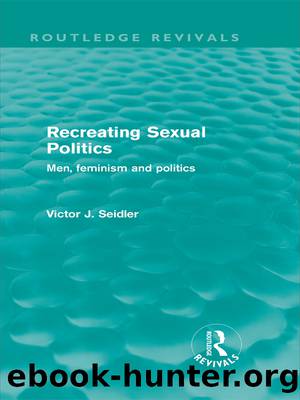Recreating Sexual Politics (Routledge Revivals) by Seidler Victor;

Author:Seidler, Victor;
Language: eng
Format: epub
Tags: ebook
Publisher: Taylor & Francis Group
Published: 2011-09-22T00:00:00+00:00
WORK AND MALE IDENTITY
Within capitalist society, work has always been an essential aspect of male identity. As men, we inherit an image of ourselves as âbreadwinnersâ looking after and providing for others in our family. Even if we have been encouraged to engage critically with this âroleâ through the emergence of the womenâs movement and women discovering a sense of their own independent identity, this conception, often unconsciously, still governs so much of our lives. We rediscover it in an abiding sense of responsibility, in the ease with which we can look after others but can barely look after ourselves. We find it in the ways we assume superiority over others, without even thinking about it.
This is an aspect of patriarchal power, which affects men in different ways depending upon our class and ethnic background and experience. Menâs sense of potency and superiority used to be strongly reinforced by work. It has been through work that men have traditionally validated themselves and have been able to sustain a positive psychological image of themselves. The tradition of skilled work within the working class allowed for a sense of pride and identity with the work done. This went along with a certain sense of male community that was built around work, especially around traditional industriesâcoal, steel, shipbuilding and others. Without work, men often experience themselves as worthless.
With the processes of deskilling which have affected all these industries in different ways, this sense of identity and identification has been undermined. But, as Cynthia Cockburn has pointed out in her investigation into the print industry in Brothers, deskilling and new technology do not inevitably challenge male élitism and power within the labour force because of the pervasiveness of established gender expectations at work. This was highlighted in the machinistsâ strike at Ford in the mid- 1980s when it became clear that if men did the work, it would be classified as skilled, but because women did it, it was not.
At the same time, with rationalisation, men have experienced themselves as increasingly controlled and subordinated at work, divided off and against each other. Menâs sense of pride and identification has been challenged. This has created a âcrisis of identityâ for an older generation of white workers who have been brought up to believe in a âfair dayâs work for a fair dayâs wageâ. They believe in doing a âmanâs jobâ and expect to do âhard workâ, so that it is a big insult to be thought of as a âslackerâ or as âwork-shyâ. In part, this structure of masculine identity makes possible the whole attempt to underpin the work ethic by labelling welfare recipients as âscroungersâ.
At the same time, contradiction is opening up between feeling that âyou should work hard and deserve every penny you makeâ and a growing awareness of the meaninglessness of work with such a small component of skill. This goes along with a realisation that the management has organised work to get as much out of labour as it possibly can, while giving as little as it can in return.
Download
This site does not store any files on its server. We only index and link to content provided by other sites. Please contact the content providers to delete copyright contents if any and email us, we'll remove relevant links or contents immediately.
| Anthropology | Archaeology |
| Philosophy | Politics & Government |
| Social Sciences | Sociology |
| Women's Studies |
Cecilia; Or, Memoirs of an Heiress — Volume 1 by Fanny Burney(32558)
The Great Music City by Andrea Baker(32020)
Cecilia; Or, Memoirs of an Heiress — Volume 2 by Fanny Burney(31956)
Cecilia; Or, Memoirs of an Heiress — Volume 3 by Fanny Burney(31942)
We're Going to Need More Wine by Gabrielle Union(19049)
All the Missing Girls by Megan Miranda(16032)
Pimp by Iceberg Slim(14509)
For the Love of Europe by Rick Steves(14124)
Bombshells: Glamour Girls of a Lifetime by Sullivan Steve(14077)
Talking to Strangers by Malcolm Gladwell(13371)
Norse Mythology by Gaiman Neil(13370)
Fifty Shades Freed by E L James(13243)
Mindhunter: Inside the FBI's Elite Serial Crime Unit by John E. Douglas & Mark Olshaker(9344)
Crazy Rich Asians by Kevin Kwan(9293)
The Lost Art of Listening by Michael P. Nichols(7506)
Enlightenment Now: The Case for Reason, Science, Humanism, and Progress by Steven Pinker(7314)
The Four Agreements by Don Miguel Ruiz(6765)
Bad Blood by John Carreyrou(6623)
Weapons of Math Destruction by Cathy O'Neil(6281)
